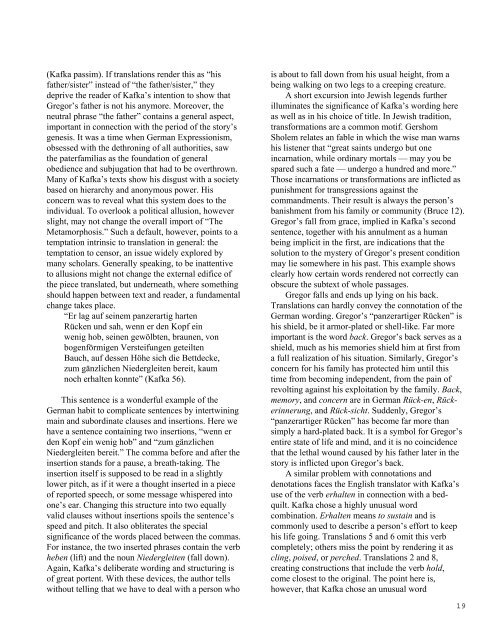their - The University of Texas at Dallas
their - The University of Texas at Dallas
their - The University of Texas at Dallas
Create successful ePaper yourself
Turn your PDF publications into a flip-book with our unique Google optimized e-Paper software.
(Kafka passim). If transl<strong>at</strong>ions render this as “his<br />
f<strong>at</strong>her/sister” instead <strong>of</strong> “the f<strong>at</strong>her/sister,” they<br />
deprive the reader <strong>of</strong> Kafka’s intention to show th<strong>at</strong><br />
Gregor’s f<strong>at</strong>her is not his anymore. Moreover, the<br />
neutral phrase “the f<strong>at</strong>her” contains a general aspect,<br />
important in connection with the period <strong>of</strong> the story’s<br />
genesis. It was a time when German Expressionism,<br />
obsessed with the dethroning <strong>of</strong> all authorities, saw<br />
the p<strong>at</strong>erfamilias as the found<strong>at</strong>ion <strong>of</strong> general<br />
obedience and subjug<strong>at</strong>ion th<strong>at</strong> had to be overthrown.<br />
Many <strong>of</strong> Kafka’s texts show his disgust with a society<br />
based on hierarchy and anonymous power. His<br />
concern was to reveal wh<strong>at</strong> this system does to the<br />
individual. To overlook a political allusion, however<br />
slight, may not change the overall import <strong>of</strong> “<strong>The</strong><br />
Metamorphosis.” Such a default, however, points to a<br />
tempt<strong>at</strong>ion intrinsic to transl<strong>at</strong>ion in general: the<br />
tempt<strong>at</strong>ion to censor, an issue widely explored by<br />
many scholars. Generally speaking, to be in<strong>at</strong>tentive<br />
to allusions might not change the external edifice <strong>of</strong><br />
the piece transl<strong>at</strong>ed, but underne<strong>at</strong>h, where something<br />
should happen between text and reader, a fundamental<br />
change takes place.<br />
“Er lag auf seinem panzerartig harten<br />
Rücken und sah, wenn er den Kopf ein<br />
wenig hob, seinen gewölbten, braunen, von<br />
bogenförmigen Versteifungen geteilten<br />
Bauch, auf dessen Höhe sich die Bettdecke,<br />
zum gänzlichen Niedergleiten bereit, kaum<br />
noch erhalten konnte” (Kafka 56).<br />
This sentence is a wonderful example <strong>of</strong> the<br />
German habit to complic<strong>at</strong>e sentences by intertwining<br />
main and subordin<strong>at</strong>e clauses and insertions. Here we<br />
have a sentence containing two insertions, “wenn er<br />
den Kopf ein wenig hob” and “zum gänzlichen<br />
Niedergleiten bereit.” <strong>The</strong> comma before and after the<br />
insertion stands for a pause, a bre<strong>at</strong>h-taking. <strong>The</strong><br />
insertion itself is supposed to be read in a slightly<br />
lower pitch, as if it were a thought inserted in a piece<br />
<strong>of</strong> reported speech, or some message whispered into<br />
one’s ear. Changing this structure into two equally<br />
valid clauses without insertions spoils the sentence’s<br />
speed and pitch. It also obliter<strong>at</strong>es the special<br />
significance <strong>of</strong> the words placed between the commas.<br />
For instance, the two inserted phrases contain the verb<br />
heben (lift) and the noun Niedergleiten (fall down).<br />
Again, Kafka’s deliber<strong>at</strong>e wording and structuring is<br />
<strong>of</strong> gre<strong>at</strong> portent. With these devices, the author tells<br />
without telling th<strong>at</strong> we have to deal with a person who<br />
is about to fall down from his usual height, from a<br />
being walking on two legs to a creeping cre<strong>at</strong>ure.<br />
A short excursion into Jewish legends further<br />
illumin<strong>at</strong>es the significance <strong>of</strong> Kafka’s wording here<br />
as well as in his choice <strong>of</strong> title. In Jewish tradition,<br />
transform<strong>at</strong>ions are a common motif. Gershom<br />
Sholem rel<strong>at</strong>es an fable in which the wise man warns<br />
his listener th<strong>at</strong> “gre<strong>at</strong> saints undergo but one<br />
incarn<strong>at</strong>ion, while ordinary mortals — may you be<br />
spared such a f<strong>at</strong>e — undergo a hundred and more.”<br />
Those incarn<strong>at</strong>ions or transform<strong>at</strong>ions are inflicted as<br />
punishment for transgressions against the<br />
commandments. <strong>The</strong>ir result is always the person’s<br />
banishment from his family or community (Bruce 12).<br />
Gregor’s fall from grace, implied in Kafka’s second<br />
sentence, together with his annulment as a human<br />
being implicit in the first, are indic<strong>at</strong>ions th<strong>at</strong> the<br />
solution to the mystery <strong>of</strong> Gregor’s present condition<br />
may lie somewhere in his past. This example shows<br />
clearly how certain words rendered not correctly can<br />
obscure the subtext <strong>of</strong> whole passages.<br />
Gregor falls and ends up lying on his back.<br />
Transl<strong>at</strong>ions can hardly convey the connot<strong>at</strong>ion <strong>of</strong> the<br />
German wording. Gregor’s “panzerartiger Rücken” is<br />
his shield, be it armor-pl<strong>at</strong>ed or shell-like. Far more<br />
important is the word back. Gregor’s back serves as a<br />
shield, much as his memories shield him <strong>at</strong> first from<br />
a full realiz<strong>at</strong>ion <strong>of</strong> his situ<strong>at</strong>ion. Similarly, Gregor’s<br />
concern for his family has protected him until this<br />
time from becoming independent, from the pain <strong>of</strong><br />
revolting against his exploit<strong>at</strong>ion by the family. Back,<br />
memory, and concern are in German Rück-en, Rückerinnerung,<br />
and Rück-sicht. Suddenly, Gregor’s<br />
“panzerartiger Rücken” has become far more than<br />
simply a hard-pl<strong>at</strong>ed back. It is a symbol for Gregor’s<br />
entire st<strong>at</strong>e <strong>of</strong> life and mind, and it is no coincidence<br />
th<strong>at</strong> the lethal wound caused by his f<strong>at</strong>her l<strong>at</strong>er in the<br />
story is inflicted upon Gregor’s back.<br />
A similar problem with connot<strong>at</strong>ions and<br />
denot<strong>at</strong>ions faces the English transl<strong>at</strong>or with Kafka’s<br />
use <strong>of</strong> the verb erhalten in connection with a bedquilt.<br />
Kafka chose a highly unusual word<br />
combin<strong>at</strong>ion. Erhalten means to sustain and is<br />
commonly used to describe a person’s effort to keep<br />
his life going. Transl<strong>at</strong>ions 5 and 6 omit this verb<br />
completely; others miss the point by rendering it as<br />
cling, poised, or perched. Transl<strong>at</strong>ions 2 and 8,<br />
cre<strong>at</strong>ing constructions th<strong>at</strong> include the verb hold,<br />
come closest to the original. <strong>The</strong> point here is,<br />
however, th<strong>at</strong> Kafka chose an unusual word<br />
19

















